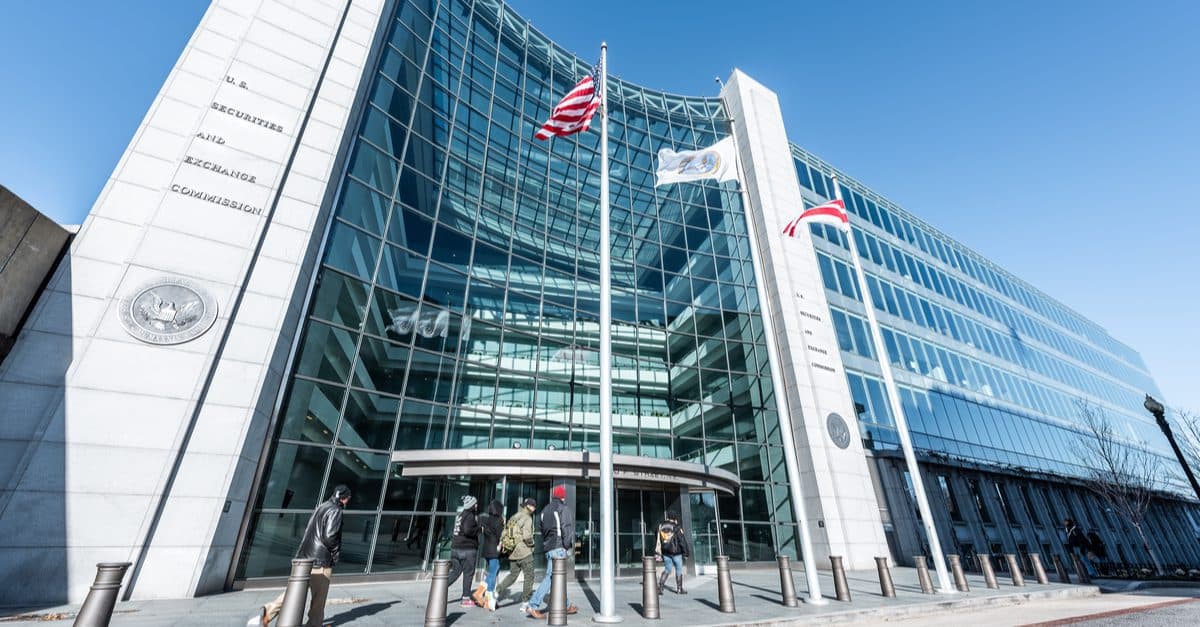SEC’s Gensler Signals that Banning Payment for Order Flow is Possibility
As problems mount with the practice popularized by Robinhood, a USC finance professor argues the alternative may be worse.

US Securities and Exchange Commission; Source: Shutterstock
- Payment for order flow is a controversial practice that has caught the attention on the SEC, and banning it is “on the table”
- Experts and analysts are mixed on whether the SEC will actually ban it, as Gensler and the Commission have a variety of priorities
Robinhood’s payment for order flow is on the rocks, with SEC chair Gary Gensler signaling that banning the practice is a possibility.
Payment for order flow is a lucrative business for Robinhood. According to disclosures the company published for its second quarter, through its payment for order flow business Robinhood generated $331 million, $142 million came from Citadel Securities. The rest was split between smaller shops.
Comments on payment for order flow were on the agenda Wednesday, when Gensler addressed European regulators. But the discussion veered toward the need to regulate crypto exchanges and setting standards for environmental social governance (ESG).
Robinhood isn’t the first company to use payment for order flow as a means to generate revenue and offer free or reduced cost trading. Analysts are mixed on whether the SEC will take action against the practice, despite Gensler claiming it’s “on the table”.
In a recent note, JPMorgan analyst Kenneth Worthington said the SEC is “highly engaged” and that it “has fined and has continued to call out Robinhood specifically for activities and actions that it is investigating.”
He wrote, “While Robinhood founders have built a company that brings investing to those that have been underserved, we don’t see a technological competitive advantage, and we see a brand and product offering that risks investors graduating to other more comprehensive financial institutions over time.”
Payment for order flow or kickbacks?
USC finance professor Lawrence Harris, who holds the Fred V. Keenan Chair in Finance at the USC Marshall School of Business, has even stronger words about payment for order flow.
 USC Finance Professor Lawrence Harris
USC Finance Professor Lawrence Harris“It’s a kickback that represents a huge agency problem,” he said during an interview with Blockworks. “In any other context payment for order flow is a kickback except in the context of the securities market.”
Harris gives an analogy illustrating how this would be illicit elsewhere. If in another life he were a purchasing officer for USC, and USC directed him to procure tens of thousands of new chairs for its classrooms he’d be guilty of a felony if he told them ‘Hey listen vendors, USC needs a lot of chairs and I’d be delighted to direct the order to you. But if you want to do business you need to pay me first’ he’d be guilty of a felony.
So why isn’t this illegal in the securities context?
“Because the SEC is the ultimate regulator, and they said it’s OK,” Harris said. “Now the claim is the brokers compete with each other and the payments for order flow get returned to the customer through competition.”
One aspect of the competitive market that benefits both Robinhood and the traders is price improvement. Given Robinhood’s scale and lucrative order flow business, it can get securities through its brokerage patterns at less than market price. Of course, the trader pays retail price but the revenue from the price difference can go to Robinhood and make up for a lack of revenue from commissions.
But this gives Citadel Securities, and others, the opportunity to front run Robinhood’s customers — the grand dilemma of the free-to-trade platforms.
“That front running is legal, Robinhood shouldn’t be permitting it because it’s hurting their clients. It’s unethical,” Harris said.
Gensler’s big decision
So what happens if Gelser doubles down and bans payment for order flow? Potentially something worse.
If Gensler moves for a ban, Harris believes that Citadel Securities would out-and-out buy Robinhood and fill the customer orders itself. This process is called internalization.
“There’s no question what the agency problem would be in both cases,” Harris said, arguing that it would be problematic to have Citadel Securities as the sole executor of trades.
But before Gensler makes a move on payment for order flow he would need to do something about internalization.
“The simple thing to do would be to say that nobody can internalize it, and nobody can be a dual trader,” Harris said.
But Harris believes that Gensler is too preoccupied with an ESG mandate given to him by the Biden White House to make a move on this now.
The core of Robinhood’s business
When Gensler made his comments about a payment for order flow ban being on the table, Robinhood’s stock slid. Likewise, when payment for order flow wasn’t a topic of discussion at Gensler’s recent appearance the stock went up.
“Many people in the industry like Robinhood are lobbying that it should be preserved,” Harris said. “The problem is the people that will get hurt are hedge funds, and they are going to lobby.”
Harris pointed out that if customers had to pay the true cost of trading via commissions they would trade less often, which isn’t necessarily a bad thing, as the gamification of trading had led to a number of market problems.
“The SEC should be promoting competition and not promoting what some call a ‘free market’. In a free market you have lots of issues,” Harris said.
“You get agency problems.” Problems like providing customers the means to trade for free, but setting up a means to trade against them.
Robinhood’s stock is currently at $44.53 on the NASDAQ, up .47% on-day.
Want more investor-focused content on digital assets? Join us September 13th and 14th for the Digital Asset Summit (DAS) in NYC. Use code ARTICLE for $75 off your ticket. Buy it now.






